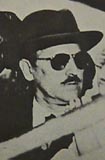|
More People |
|||||||||||||||||||
|
|
|||||||||||||||||||
|
|||||||||||||||||||
|
|
|||||||||||||||||||
|
When Ramón Grau became President in 1944, Prío was given a the position of the Minister of Labor in Grau's cabinet. Prío did his job well and became quite popular.Grau was no longer the candidate of choice among the Auténticos; they chose Prío as his successor. Prío won, beating Ricardo Núñez Portuondo by 30,000 votes. Prío entered office on October 10, 1948. His laws against gangsters in Cuba were never very productive, nor were they meant to be. Prío made enemies of Eduardo Chibás, the Communists, and Batista. His policies often failed to support government programs and yet he seemed to acquire large sums of money.During his Presidency, Prío created an Agricultural and Development Bank to be lead by Justo Carillo. He also began a program for public works. In 1952, Fulgencio Batista began planning to overthrow Prío. A large conspiracy involving many members of the army put its plan into action that year. When Batista began taking over bases, Prío had to decide what to do. Some troops were still loyal to him, and the university students supported the constitutional government. Instead of resisting Batista, Prío fled to the Mexican embassy with other leaders of the government. Arms promised to the students never arrived, and Batista took power easily. This ended the rule of the constitution. Prío was granted amnesty and returned to Cuba on August 11, 1955. When Fidel Castro was in Mexico, Prío gave him money to support his opposition movement. Castro used the money to purchase a boat, the Granma, which brought his rebels back into Cuba. After the Revolution of 1959, Prío greatly backed the Agrarian Reform of the new government. Eventually he moved out of Cuba and lived until 1977. |
|||
 Carlos Prío served as President of Cuba and has played an important role in the nation's history.
Carlos Prío served as President of Cuba and has played an important role in the nation's history.